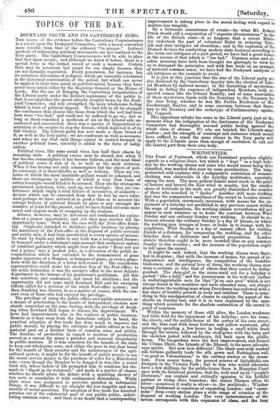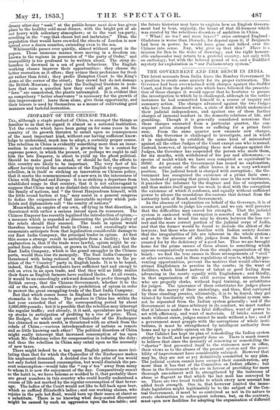WHITS U1N
Tim Feast of Pentecost, which our Protestant populace slightly regards as a religious feast, but which is "kept" as a high holy- day by the working classes and some who would resent being thus classified, was marked this year by some peculiarities. The long-
protracted cold explains why a comparative restriction of summer clothing was observable in the holyday multitudes, especially among the men. The more gallant female mind stuck to the point of honour and braved the East wind in muslin, but the smaller share of fortitude in the male sex greatly diminished the number of those who marched in "ducks." Another still more striking fact was the comparative smallness of the crowd in London streets. With a population enormously increased, with means for the en- joyment of a holyday not paralleled in any previous season within the scope of comparison, the working classes nevertheless did not appear in such numbers as to make the contrast between Whit Sunday and any ordinary Sunday very striking. It should be so ; because whereas the ordinary Sunday is a day of leisure, in which the working man lounges at home or looks in to lounge with his neighbour, Whit Sunday is a day of annual effort, for visiting friends at a distance, for compassing the wedding, and for other holyday feats of deliberate and special preparation. London streets therefore ought to be more crowded than on any common Sunday in fine weather ; and the increase of the population ought to tell upon the crowd.
It might be said, indeed, that the working classes were there, but in disguise; that with the increase of means, the spread of in- dependence and intelligence, the competition of the humbler tradesmen, and the natural love of dress, the working classes now wear a costume so like that of others that they cannot be distin- guished. The shop-girl or the nurse-maid out for a holyday is garbed "like a lady, and the journeyman in his well-cut clothes is undistinguishable save for that " je ne sais quoi" which is not always found in the wealthier and more educated man, nor always absent from the working man whom Providence has endowed with a fair share of healthy growth in body and intellect There is some- thing in this amalgamation of classes to explain the aspect of the streets on Sunday last, and it is in turn explained by the same thing which accounts for the absolute contraction of the crowd in point of numbers.
Within the memory of those still alive the London workman had little field for the enjoyment of his holyday, save his home, the streets, and the public-house at the corner of his own street; and the blue coat with brass buttons and yellow waistcoat, after paternally spending a few hours in leading a small white frock through the streets, followed by the stuff gown with the baby and the skeleton jacket with corduroys, fell back upon the public- house. The tea-gardens were the first improvement, and formed the Ultima Thule, the Islands of the Blessed to the more adventu- rous spirits. But now how different! The black coat with worked silk buttons gallantly leads the silk gown and Nottingham veil, "as good as Valenciennes," to the railway station or the steam- boat. Even nearer home, the poorest weaver of Spitalfields can dissipate in the Victoria Park ; but to him who would otherwise have a few shillings for the public-house there is Hampton Court open with its historical pictures, that he, well read up in "peoples literature," can explain and critically appraise to his faithful partner or rising dive branches ; the classic Thames offers its silver—sometimes it really is silver—to the multitude ; Windsor beyond Richmond is conscious of expanding London ; and "excur- sions " from every station place a wide range of counties at the disposal of working London. The very entertainment of the tavern- corresponds with this expansion of ideas, and the long dreary after-day "soak" at the public-house next door has given place to the healthy cold-meat dinner, with the bright pot of ale not heavy with sedentary atmosphere; or to the vast tea-party, revellinF in the "cup that cheers but not inebriates." Thus, the population that would have crowded the streets of London is now spread over a dozen counties, extending even to the sea.
Whitsuntide passes over quietly, almost without report in the papers. Those immense masses were moving in a freedom un- known to the regions in possession of "the party of Order," and tranquillity is too profound to be written about. The stray de- banchee is drowned in a sea of good behaviour. The English working classes improve their opportunities : they choose the better recreation as it offers; they evince their preference for fresh air rather than fetid ; they prefer Hampton Court to the King's Arms at the corner of the street; they crowd but do not damage the British Museum ; they visit the Zoological Gardens in num- bers that raise a question how they could all get in, and the " feral " are unmolested, the plants untrampled. It is evident that no compulsory "better observance" is necessary for the growth of this improvement : leave them alone, give them opportunity, and their leisure is used by themselves as a means of cultivating good manners and tasteful recreation.



























 Previous page
Previous page